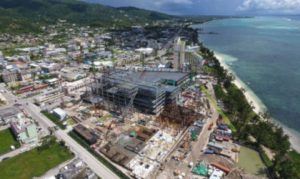In the Commonwealth of the Northern Mariana Islands, gaming officials have reportedly given four additional junket operators permission to offer their services to players at the under-construction Imperial Palace Saipan integrated casino resort.
Two-year licenses granted:
According to a report from GGRAsia citing an earlier story from the local Marianas Variety newspaper, the latest junket firms to receive a two-year license from the Commonwealth Casino Commission on Monday included Hongyi Ma’s Stellar Paradise CNMI LLC as well as the High Tides (CNMI) LLC entity of Jiming Dong.
It further reported that all of the newest licensed operators, which also comprise Hong Zhang’s Bula Mula LLC alongside the Hengqin Guiji LLC enterprise of Ni ‘Lily’ Ren, were required to commit to local programs designed to stamp out money laundering and the financing of terrorist groups while moreover agreeing to abide by local tax and immigration laws.
Operator ‘working closely’ with regulators:
Imperial Palace Saipan is a venture of Imperial Pacific International Holdings Limited and the Hong Kong-listed casino firm used a portion of its interim financial results for the six months to the end of June to declare that it had been ‘working closely with gaming promoters and regulators for the grant of junket operator licenses’.
Imperial Pacific International Holdings Limited’s Monday statement read…
“Having the advantage of the Commonwealth of the Northern Mariana Islands’ relatively low tax regime, we believe we will be able to offer very competitive commission rates to potential gaming promoters.”
Tax rates revealed:
Imperial Pacific International Holdings Limited reportedly detailed that its operations in the American territory are subject local income taxes although it can claim rebates worth up to 90% on anything over $15 million while its gross revenues are liable for duties ranging between 1.5% and 5%.
 VIP player debts rise:
VIP player debts rise:
The casino operator used its half-year interim financial results to explain that rolling chip volumes for VIP players at its Saipan property had dropped by 48.6% year-on-year to stand at around $12.8 billion with the property’s gross trade receivables, which is most often associated with the amount of cash owed by high-rolling gamblers, rising by slightly over 3% to stand at approximately $1.7 billion.
The resort reportedly explained that its ten most in-debt high-value players owed a combined $314.8 million with just over $139.4 million of this amount attributable to only one individual.



